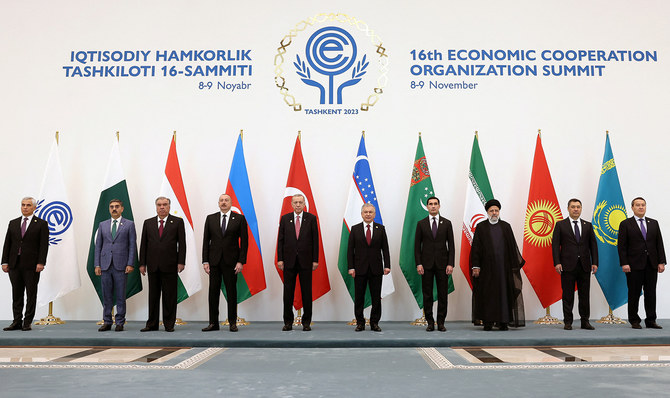ISLAMABAD: Caretaker Prime Minister Anwaar-ul-Haq Kakar emphasized regional integration while addressing the 16th Economic Cooperation Organization (ECO) Summit in Tashkent on Thursday, saying that the regional forum was only contributing two percent to the overall global trade despite its enormous potential.
The ECO, an intergovernmental organization, was established by Pakistan, Iran and Turkey in 1985 before expanding its membership to include Central Asian states that have traditionally remained under the Russian influence.
These countries are now striving to explore more international partnerships amid Moscow’s weakening hold on the region in the wake of its decision to invade Ukraine. They are also trying to bolster their landlocked economies by trying to access the sea via Pakistani ports located on the Arabian Sea.
The Pakistani prime minister, who arrived in Tashkent a day earlier, thanked the Uzbek authorities for extending a warm welcome ahead of the summit.
“The ECO region is blessed with natural resources, geographical contiguity, enterprising people and a cultural heritage that can serve as a basis to expand trade and economic integration in this area,” he said during his address to the forum. “Nevertheless, despite our enormous potential and infinite resources, we have a share of only two percent in the global trade and eight percent in intra-regional trade.”
The prime minister noted the ECO states’ overall imports within the region were only recorded at $39 billion in 2022 against the total world imports of $577 billion in the same period. Similarly, he added, the bloc’s intra-regional exports stood at $46 billion compared to the total world exports of $459 billion.
“This shows how the region has still not been able to achieve its true potential of increasing exports from the ECO region to the world,” he said.
The prime minister said it was important for ECO member states to figure out how they could increase their share in the global and intra-regional trade, become more competitive and reduce barriers to economic integration.
“Let’s make ECO the organization not just of words but action, not just of commitments but implementation,” he added.
Kakar congratulated Iran for taking over the 2024 ECO presidency while announcing that the organization’s next secretary-general would be from Pakistan.
He has held meetings with Uzbekistan President Shavkat Mirziyoyev along with Azerbaijan President Ilham Aliyev on the sidelines of the event.
The prime minister is also expected to visit the historical city of Samarkand where he will go to the shrine Imam Bukhari, a 9th-century Islamic scholar who played a pivotal role in the compilation of Hadith literature.
















